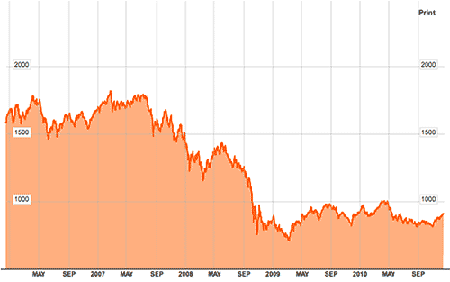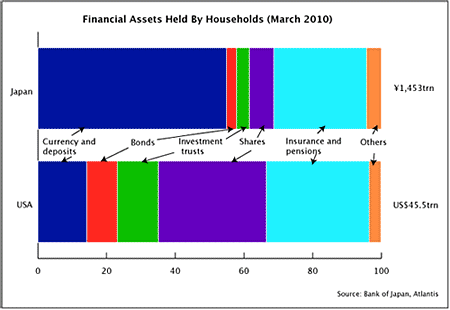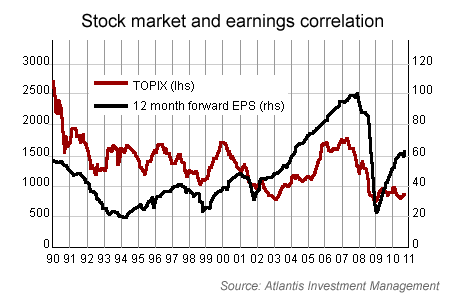Three small caps that can grow in Japan
Japan has not been a good place to invest lately. But while large Japanese companies tend to have little scope for growing their earnings, smaller firms can have better prospects. Cris Sholto Heaton finds reasons to be optimistic about Japan, and tips three small-cap companies with decent prospects for growth.

Get the latest financial news, insights and expert analysis from our award-winning MoneyWeek team, to help you understand what really matters when it comes to your finances.
You are now subscribed
Your newsletter sign-up was successful
Want to add more newsletters?

Twice daily
MoneyWeek
Get the latest financial news, insights and expert analysis from our award-winning MoneyWeek team, to help you understand what really matters when it comes to your finances.

Four times a week
Look After My Bills
Sign up to our free money-saving newsletter, filled with the latest news and expert advice to help you find the best tips and deals for managing your bills. Start saving today!
Japan is one of the world's biggest stock markets. But I don't write about it often in MoneyWeek Asia. That's because it's a very different place to most of its neighbours.
They're fast growing and mostly still developing. Sentiment in their markets is very positive. Japan is quite the opposite. Yes, much of the commentary you see about it is misleading. It's not a two-decade slough of despond: it's an advanced country with an excellent standard of living. It's home to some of the world's best-run and most innovative companies. But it's not been a good place to invest of late.
Over the last year, for example, a UK investor would have made around 12% from the iShares MSCI Japan ETF (LN: IJPN). But almost all that gain comes from the strength of the yen against the pound. In yen, the stock market is almost unchanged.
MoneyWeek
Subscribe to MoneyWeek today and get your first six magazine issues absolutely FREE

Sign up to Money Morning
Don't miss the latest investment and personal finances news, market analysis, plus money-saving tips with our free twice-daily newsletter
Don't miss the latest investment and personal finances news, market analysis, plus money-saving tips with our free twice-daily newsletter
So when might Japan turn the corner? And is there anything worth buying there now? I caught up with a visiting Japan manager last week and came away more interested than I expected
Three reasons not to buy Japan
But to start with, let's look at the consensus view. Despite all its top quality companies, Japan presents several problems from an investment perspective.
First, it's not exceptionally cheap. Many people argue that it is, because the price/net asset value is around one probably the lowest anywhere in the world. But this reflects the Japanese corporate sector's low earnings on those assets. The return on equity is around half that in the UK and US. If you consistently earn less from your assets, the price paid for those assets should be correspondingly low.
Second, the Japanese market has been hitting new lows ever since the bubble. And while the latest might simply have been panic brought on by the global crisis, the market has yet to recover like the rest of the world (see chart below). The yen has almost hit a record high but little of that foreign buying of the currency goes into equities. Indeed, the strong yen hurts the stockmarket because of fears over its impact on exporters.

So there's the problem of what might turn this around and encourage highly disillusioned investors back into the market. And until there's an obvious catalyst, it's hard to argue that it pays to be in Japanese equities.
And that brings us to the third point: Japanese companies have a poor track record when it comes to rewarding shareholders. This reflects a corporate culture that sees customers, employees and supporting members of the same keiretsu (a group of interlocking companies) as more important. The market may now be yielding around 2%, which is high by its standards. But when I can buy Singaporean small caps that yield 3.5%-4% and which have strong growth prospects, it doesn't seem that compelling relatively.
Two reasons to be more optimistic
So is there any reason to suppose the Japanese market might turn the corner soon?
Last week I met Taeko Setaishi, the manager of the Atlantis Japan Opportunities Fund (AJOF), on a marketing trip in London and a couple of charts from her presentation jumped out at me.
As you may well know, Japanese households have tended to hold their savings in cash rather than in shares or other assets. In an environment with entrenched deflation ie prices keep falling even the very low yields available on long-term fixed deposits have offered an adequate and safe return. Meanwhile, 20 years of stockmarket losses have made equities seem pretty unattractive.
Still, the chart below illustrates this much more starkly than I'd seen it before. Over half of household assets are in cash and term deposits. Just 11% are in shares and funds, while less than 3% are in bonds. (If you're wondering how this fits with Japan's debt being mostly held domestically, much of the cash that individuals place with the banks is in turn invested in Japanese government bonds rather than being turned into private sector loans.)

Clearly there's a large amount of cash that could be recycled into stocks. And with several large tranches of time deposits expiring over the next few years, there will be lots of money looking for a new home. Hopefully some of it will end up in stocks.
But are people likely to return to Japanese stocks, rather than just seeking out the best rate they can get on another deposit or even putting their cash into an international equity fund? This is where the chart below comes in. This shows the Topix market benchmark (red line) and analysts' earning forecasts (black line) for the next year.

You can see that in 2003, earnings began to improve sharply but it took a couple more years before the market started following them up. Perhaps long-suffering investors didn't believe that the improvement was real.
The same seems to be happening this time. Forecasts are heading up. And despite the cries of anguish over the strong yen from exporters, the half-year results show much of the market actually beating expectations. Yet the Topix continues to go nowhere. If the forecasts hold up, perhaps investors will return after a similar wait to last time.
Three interesting Japan small caps
So what might be attractive?
Fund manager meetings often throw up good portfolio themes. This meeting was especially interesting, because showed rather well that you can find stocks that defy your expectations in almost any market especially if you're prepared to hunt around the small cap segment. (NB: I haven't looked at these companies in detail myself they're simply ones that stood out to me in the AJOF portfolio.)
For example, we all know that that Japanese companies rarely offer good yields. But Kokusai (JASDAQ: 7722) the global leader in tyre balancing machines is a striking exception. This small cap has earnings per share growth of 10-17%, trades on an estimatedprice/earnings ratioof six and yields around 5% on Atlantis's figures (although the shares have risen a bit since then).
And while Japanese large caps tend to have little fresh scope for growing their earnings, smaller firms can have better prospects. Another promising-looking Atlantis stock is Message (JASDAQ: 2400). It provides sheltered accommodation, which is in short supply in Japan. This stock clearly has growth potential given Japan's ageing population.
Equally intriguing is Nihon M&A Centre (TOKYO: 2127). It's a play on a theme that's been mentioned here and in MoneyWeek before: the thousands of smaller companies in Japan whose founder wants to retire but has no-one to take over the business. The fees here are too small to interest investment bank M&A teams. But companies like Nihon M&A Centre can earn good profits acting as intermediaries to bring buyers and sellers together. And they collect fees from both sides.
Overall, my stance on Japan remains the same as before. I still have some Japan holdings within my pension plan, but I'm not yet willing to add to them again. Most of all, I'd like to see the return of inflation first. I think that could be a key factor in persuading people to switch out of low-yielding deposits and put some money into stocks. (I'm not alone in this Marc Faber and Dylan Grice have both argued that Japanese equities might actually be a rather good inflation hedge.)
We saw a positive inflation figure in October for the first time since December 2008. I'm not sure this will be sustained there were special factors like a cigarette duty hike. But it's something I'm going to be keeping a close eye on. And when the time comes, smaller equities through a fund like Atlantis's or through an ETF such as iShares MSCI Japan Small Cap (LN: ISJP) will probably be one of the best ways to invest.
This article is from MoneyWeek Asia, a FREE weekly email of investment ideas and news every Monday from MoneyWeek magazine, covering the world's fastest-developing and most exciting region. Sign up to MoneyWeek Asia here
Get the latest financial news, insights and expert analysis from our award-winning MoneyWeek team, to help you understand what really matters when it comes to your finances.

Cris Sholt Heaton is the contributing editor for MoneyWeek.
He is an investment analyst and writer who has been contributing to MoneyWeek since 2006 and was managing editor of the magazine between 2016 and 2018. He is experienced in covering international investing, believing many investors still focus too much on their home markets and that it pays to take advantage of all the opportunities the world offers.
He often writes about Asian equities, international income and global asset allocation.
-
 ISA fund and trust picks for every type of investor – which could work for you?
ISA fund and trust picks for every type of investor – which could work for you?Whether you’re an ISA investor seeking reliable returns, looking to add a bit more risk to your portfolio or are new to investing, MoneyWeek asked the experts for funds and investment trusts you could consider in 2026
-
 The most popular fund sectors of 2025 as investor outflows continue
The most popular fund sectors of 2025 as investor outflows continueIt was another difficult year for fund inflows but there are signs that investors are returning to the financial markets